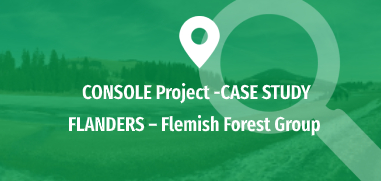Summary
Due to the fragmented nature of forest ownership, groups of private forest owners and managers (Forest Groups) have been established in Flanders (Belgium). These forest owner associations oversee voluntary co-operation between the large number of private forest owners and sometimes
public forest managers. Their objective is implementation of improved and more coherent forest management practices. The 11 active Forest Groups in Flanders cover the whole territory and have almost 13.000 members (about 13% of all forest owners). The interests of the owners contracting membership are vested in the coordinated management of their forest parcels and the professional expertise and service they receive from the Forest Group. This represents i.a. administrative support, coaching and technical support, organization of joint wood sales, voluntary participation to projects or the setting up of combined management plans.
Objectives
- Realization of afforestation and activation of forest compensation
- Development of profitable resilient forests;
- Achievement of conservation objectives in Natura 2000 areas;
- Management of fragmented forests;
- Promotion of neighborhood and play forests;
- Support of local production and processing of a climate-friendly raw material;
- Support the livability of the local timber sector;
- Ensuring support in Flanders for sustainable multifunctional forest management;
- Appreciating private forest owners for their social commitment;
- Support not only private forest management, but also public forest
- management.
Public Goods









Problem description
Forest ownership in Flanders is very fragmented. Most forest owners often have very little knowledge of forest management and little trust in government handling as such. They do have faith in the Forest Groups. Within these Forest Groups, the aspects of trust and voluntary approach are predominant, giving the forest owner the necessary freedom of decision. They allow forest owners to incorporate the management of their forests in a larger project. Most owners are proud to be part of a process towards better forests. Many forest owners are also quite happy with the support they receive to manage the forests in a better way. In this sense, the Forest Groups act as promoters and facilitators of a global forest policy. Small forest owners, who have no obligation to produce a management plan, often have an ‘ad hoc’ management, using felling applications and permits. They are stimulated by the Forest Groups to participate in joint management plans.
